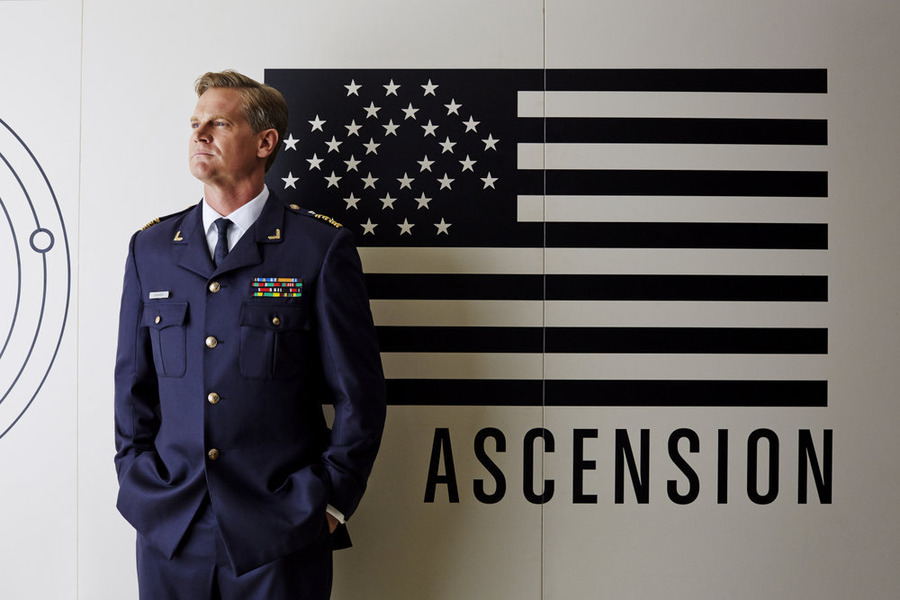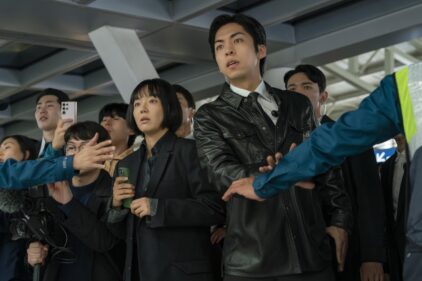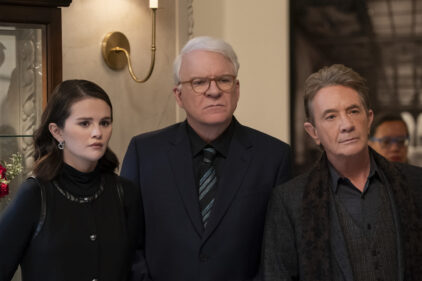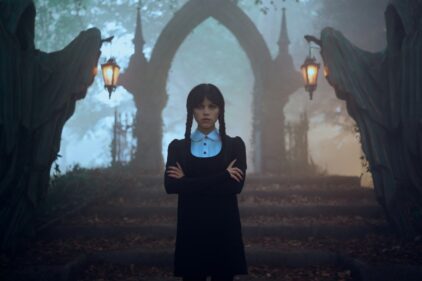It’s been some time since I openly praised something on the
struggling SyFy network, and so I’m as happy as anyone to report that their
mini-series “Ascension,” airing over six hours on three nights starting Monday,
December 15, is pretty damn fun. Playing with themes explored on “Battlestar
Galactica” and in “Snowpiercer,” believe it or not, “Ascension” is smarter than
it looks—the kind of B-TV escapism that often gets undervalued because it’s
somehow deemed lesser than programming that wears its intellectual aspirations
on its sleeve. “Ascension” is a clever card game in that it starts by promising
one thing, shifts to another, and ends the first night with a phenomenal twist
ending that takes the whole venture in another direction. Some of the
performances are thin and I wish the dialogue went through one more rewrite but
it’s the narrative here that’s surprisingly fun. SyFy is smart to air it over
three nights—get in, entertain, get out.
As in so much great science fiction, the U.S. government has
been keeping secrets. In 1963, at the height of the space race, the United
States was much further ahead than we knew. In fact, they had developed a top-secret
operation to send an entire colony into outer space to look for a new world to
populate, “Interstellar”-style. The project, known as Ascension, led to the
creation of a massive space station that would support not just life within it
but a virtual recreation of an Earthbound community, complete with holographic
capabilities that make it look like the inhabitants of Ascension live in a
1960s neighborhood. There are pools, foliage, and living quarters that barely
belie the fact that this is not a home but a ship hurtling through space.
Generations are born and die on Ascension, as the populous approaches the point
of no return on their mission to a new land.
This sheltered world is shattered in the opening scenes by the
murder of a young woman. When it’s discovered that she was shot, everything
they know about Ascension starts to collapse. Why? There are no guns in this
world. Well, there shouldn’t be. Did someone really smuggle a gun aboard 50
years ago and wait a half-century to use it? What’s going on? First Officer Oren
Gault (Brandon P. Bell) is eager to investigate but the powers that be keep
trying to retain order about the ship. Much like “Snowpiercer,” the Ascension is
a society built on structure. Those born in the lower decks stay in the lower
decks. And the threat of murder could force everything to collapse. Meanwhile,
back on Earth, Gil Bellows plays a man whose father had something to do with
the launch of Ascension, and it’s clear now that something is wrong. The final
scene of the opening night answers a ton of questions while brilliantly posing
new ones, and virtually forcing viewers to watch the next night to see where “Ascension”
goes next.
“Ascension” is all about breakneck plotting. Don’t ask
questions or the suspension of disbelief will shatter. And don’t worry too much
about the thin characters (although casting someone as charismatic as Tricia
Helfer as one of them certainly helps). The pace of “Ascension” comes from a
constant stream of questions: Who is the killer? Why was she killed? Is someone
trying to sabotage the ship to force it to return to Earth? What’s going on
back on Earth? And the writers very cleverly answer the questions posed in a
timely fashion, reshaping the narrative in ways that keep viewers engaged
instead of just leaving them hanging over all three nights.
It helps that “Ascension” has a degree of craftsmanship that
has been missing from many SyFy productions of late (having Jason Blum as a
producer probably helped—the head of Blumhouse knows how to take small budgets
and make them look big). The ‘60s style art direction adds a lot to the final
product in that it makes these interstellar travelers feel even more like a
people stuck in the wrong place and the wrong time. Not unlike the people of “Pleasantville”
or “The Truman Show,” they are unshaped by the society that has progressed
without them back on Earth. And the show is very tightly edited, never allowing
for the narrative sag that often comes with TV sci-fi.
Yes, some of the dialogue, particularly the expository bits
that explain the investigation or the secret of the Ascension in the second
episode, can be a bit eye-rolling. The script needed another pass. Although
every time a false character beat or bad line started to bug me, a plot twist
brought me back. Do the characters over-explain the plot? Sure, but at least it’s
a plot worth explaining.














